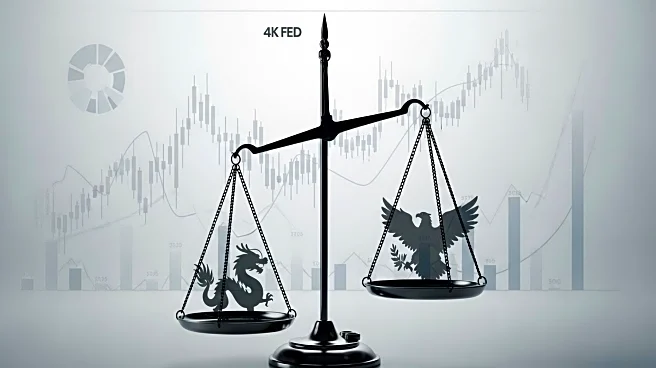What is the story about?
What's Happening?
The U.S. stock market experienced mixed movements as investors reacted to ongoing trade tensions with China and remarks from Fed Chair Jerome Powell. The Dow Jones rose slightly, while the S&P 500 and Nasdaq showed varied performance. Powell's speech indicated potential future rate cuts, amid a lack of economic data due to a government shutdown. China imposed sanctions on U.S.-linked South Korean shipbuilding units and introduced special port fees, escalating trade tensions. Meanwhile, major banks reported third-quarter earnings, with mixed results affecting stock prices.
Why It's Important?
The stock market's response to trade tensions and economic uncertainty highlights the interconnectedness of global trade and financial markets. China's retaliatory measures against U.S. shipping interests could impact maritime trade and related industries. Powell's comments on potential rate cuts suggest ongoing concerns about economic stability, influencing investor sentiment. The earnings reports from major banks provide insights into the financial sector's health, with implications for broader economic trends. These developments underscore the challenges faced by policymakers and businesses in navigating trade disputes and economic uncertainty.
What's Next?
Investors will closely monitor upcoming economic data releases, including the delayed consumer inflation report, for insights into the U.S. economy's direction. The ongoing trade tensions may lead to further retaliatory measures, affecting global supply chains and market stability. The Fed's potential rate cuts could influence borrowing costs and investment strategies. Stakeholders, including businesses and policymakers, will need to adapt to these evolving conditions, balancing short-term challenges with long-term strategic planning.
Beyond the Headlines
The trade tensions and economic uncertainty reflect broader geopolitical dynamics, with implications for international relations and economic policy. The situation raises questions about the future of global trade agreements and the role of economic diplomacy in resolving disputes. The interplay between monetary policy and trade tensions highlights the complexity of managing economic growth in a globalized world.















